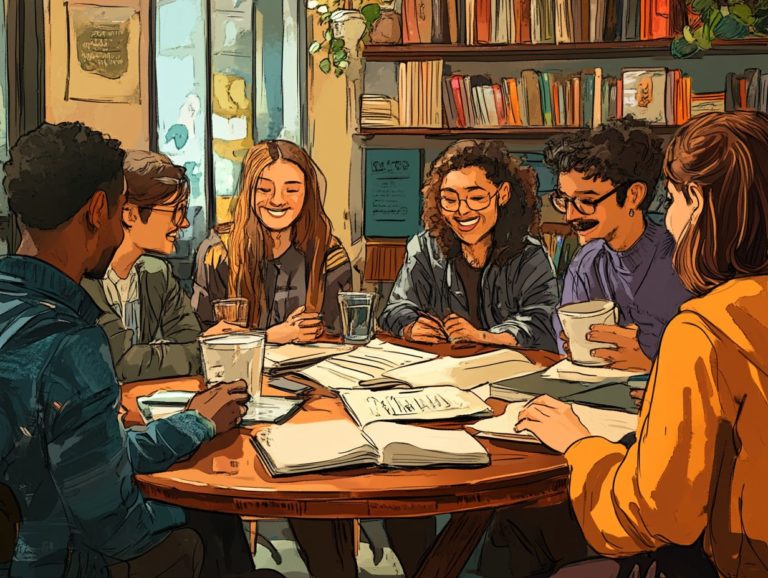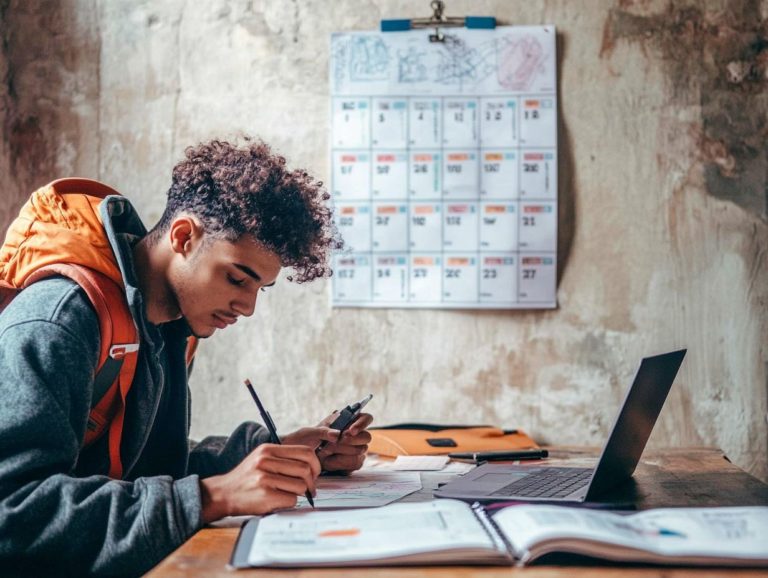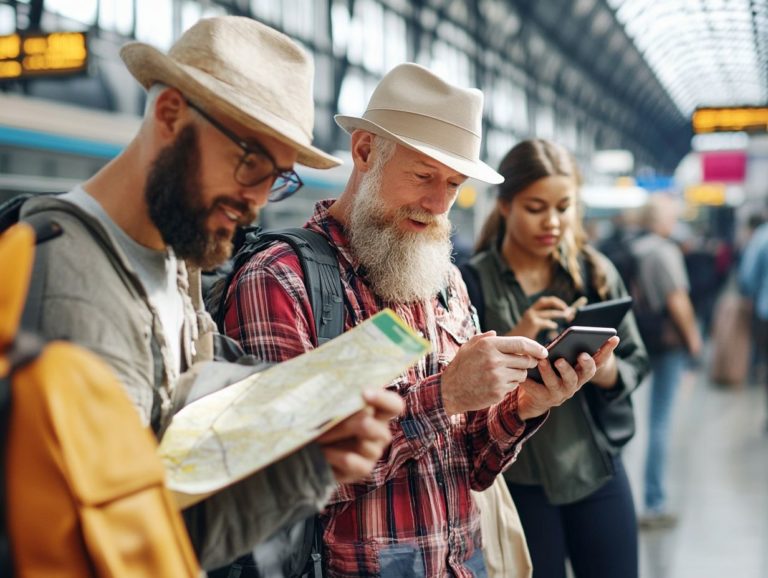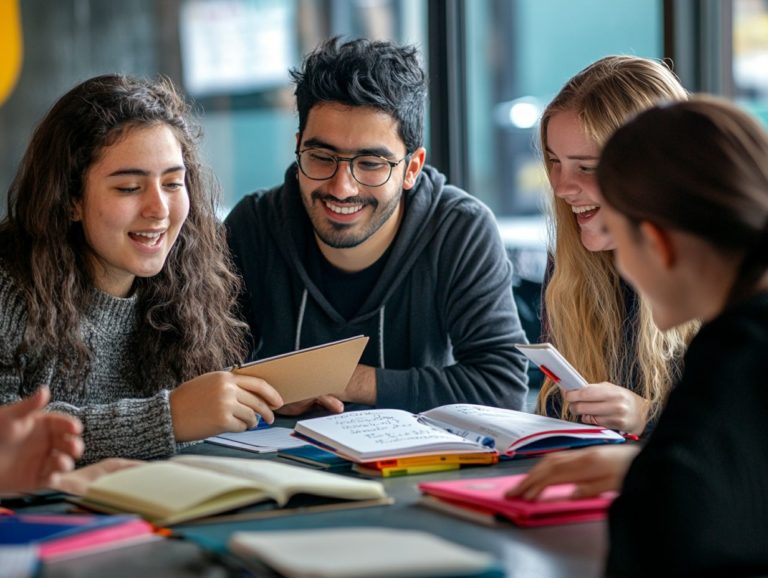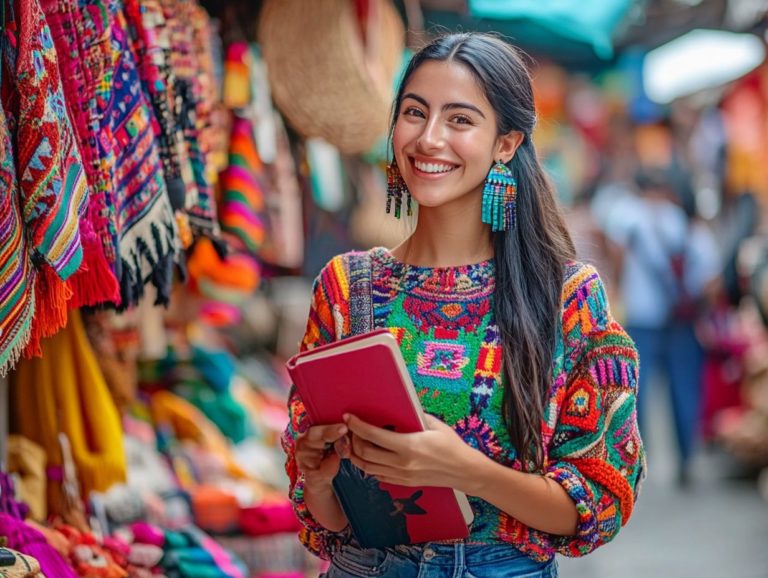How to Overcome Language Barriers While Traveling
Traveling to new places can be an exhilarating adventure, yet it can be challenging, particularly in communication. Language barriers can lead to misunderstandings and impede genuine connections with locals.
This exploration delves into the significance of overcoming these barriers, highlighting the advantages of effective communication and the rich cultural nuances that come with it.
From mastering essential phrases to leveraging translation tools, you ll uncover practical strategies designed to elevate your travel experience and cultivate meaningful interactions, no matter the language spoken.
Contents
- Key Takeaways:
- The Importance of Overcoming Language Barriers
- Common Language Barriers While Traveling
- Strategies for Overcoming Language Barriers
- Learning Key Phrases and Words
- Utilizing Translation Tools
- Tips for Communicating with Non-English Speakers
- Preparing for Language Barriers Before Traveling
- Ready to make your travels unforgettable? Let s dive into how you can conquer language barriers and connect with locals!
- Frequently Asked Questions
- What are some common language barriers travelers may face?
- How can I prepare for language barriers before traveling?
- What are some strategies for overcoming language barriers while traveling?
- What should I do if I encounter a language barrier while traveling alone?
- How can I make sure I am not being taken advantage of in a country where I don’t speak the language?
- Is it considered rude to not speak the language of the country I am visiting?
Key Takeaways:
The Importance of Overcoming Language Barriers
Overcoming language barriers is essential for elevating your travel experiences and fostering genuine connections with locals. When you can communicate effectively, you enrich your adventures and create opportunities for understanding different cultures and learning from each other.
This opens the door to deeper cultural interactions, particularly in regions where local languages vary widely. By bridging these communication gaps, you not only enhance your personal growth but also forge meaningful connections that can transform your journey.
Benefits of Effective Communication
Effective communication while traveling offers a wealth of benefits, including better conversations with people and a deeper appreciation of local culture.
When you embrace local languages, you break down barriers and cultivate friendships with residents, creating unforgettable memories. These interactions offer valuable travel advice and help you navigate challenges that may arise during your journey. Engaging with locals opens the door to immersive learning experiences, revealing traditions and customs that guidebooks often miss.
As you practice your language skills, you ll notice a transformation in yourself gaining adaptability and confidence that enriches your adventures and broadens your horizons.
Common Language Barriers While Traveling
As a traveler, you may often face familiar language barriers that can significantly impact your experiences. These challenges can stem from cultural differences and varying levels of fluency in the local language, creating obstacles that might leave you feeling disconnected from the vibrant tapestry of your surroundings.
Cultural and Linguistic Differences
Cultural and linguistic differences can present significant hurdles for you as a traveler, often leaving you feeling disconnected or even frustrated throughout your journey. These challenges can profoundly influence your overall travel experience, making effective language skills essential for fostering meaningful interactions.
For example, in Japan, the emphasis on politeness and indirect communication might make straightforward queries feel a bit awkward. In Brazil, the vibrant and warm approach can be initially overwhelming if you’re not accustomed to such openness.
If you’re venturing into France, you may find yourself puzzled by the cultural significance of greetings and small talk before transitioning to business or serious discussions. Grasping these nuances not only elevates your trip but also equips you with valuable travel tips for building genuine connections across diverse cultural landscapes.
Strategies for Overcoming Language Barriers
You have a wealth of effective strategies at your disposal for navigating language barriers while traveling. Whether it’s mastering a few key phrases to engage with locals or harnessing technology to enhance your communication, you can navigate these challenges with confidence.
With these tips, you ll tackle communication challenges like a pro!
Learning Key Phrases and Words
Learning key phrases and essential vocabulary can elevate your travel experience. It allows you to connect with locals and navigate new environments with ease.
For instance, mastering simple greetings and polite expressions like “hello,” “thank you,” and “please” in various languages can significantly enhance how you are received. Using flashcards, language apps, or signing up for local classes can quickly improve your vocabulary.
Even a basic grasp of the local language can break down barriers and create genuine relationships. This transforms a typical visit into a truly enriching cultural experience.
Before traveling, practice these phrases and seek opportunities for conversation. This can profoundly enhance your journey.
Utilizing Translation Tools
Using translation tools like Google Translate or Duolingo can help you navigate language barriers while traveling.
These tools offer features like real-time translation, voice recognition, and contextual understanding, making communication easier. Many language dictionary apps also provide offline access, which is a lifesaver when Wi-Fi is scarce. Reliability is crucial; while some apps are great for common phrases, they can struggle with complex grammar or regional dialects.
To ensure a smoother experience, familiarize yourself with a few essential phrases and double-check translations. The subtleties of language can sometimes get lost in translation.
Tips for Communicating with Non-English Speakers
When communicating with non-English speakers, approach the conversation with patience and respect. Adapting your style to fit various cultural contexts enhances understanding and fosters a more meaningful dialogue.
Non-Verbal Communication
Non-verbal communication is vital for bridging language gaps. Gestures and visual cues often convey messages more effectively than words.
A thumbs up can mean ‘good job’ in some cultures, but be careful it can offend in others. In many Middle Eastern countries, the ‘OK’ hand gesture can carry vulgar implications. This highlights the need for cultural sensitivity.
Non-verbal signals include facial expressions and posture, which convey feelings and intentions. By honing your awareness of these nuances, you can navigate intercultural interactions with greater ease, paving the way for more effective communication.
Patience and Respect
Approaching conversations with patience and respect is vital for effective communication, especially in culturally diverse settings.
Take time to understand and appreciate local customs. Acknowledging traditions can lead to meaningful discussions.
In many cultures, maintaining eye contact shows respect, while in others, it may seem confrontational. Practicing patience allows you to adapt your communication style, creating a more positive and enriching experience.
This commitment to cultural communication facilitates smoother interactions and fosters mutual respect and understanding.
Preparing for Language Barriers Before Traveling
Prepare for potential language barriers before your travels. This can greatly enrich your experience and simplify communication challenges. Anticipating obstacles equips you to navigate new environments with confidence and clarity.
Ready to make your travels unforgettable? Let s dive into how you can conquer language barriers and connect with locals!
Researching the Destination
Researching your travel destination in detail can unlock a wealth of insights into the local culture and language. This knowledge makes it easier for you to connect with the locals.
By immersing yourself in the customs (the traditional ways people behave in a culture), traditions, and social etiquette, you can foster meaningful interactions that often lead to unique experiences beyond the typical tourist path. Understanding regional dialects opens up amazing conversations, allowing for more fluid communication and helping you feel more at ease in unfamiliar surroundings.
Being aware of what is considered respectful or taboo can prevent misunderstandings and enhance your overall experience. Embracing these travel tips not only enriches your journey but also establishes goodwill, laying the groundwork for genuine connections with the people you meet along the way.
Learning Basic Phrases and Customs
Learning some basic phrases and customs before you set off on your journey can significantly elevate your travel experiences. It makes your interactions with locals much smoother.
When you master simple greetings like “Bonjour” in France or “Hola” in Spain, you re not just saying hello; you re opening the door to meaningful conversations that can lead to unexpected friendships. Familiarizing yourself with local customs such as bowing in Japan or understanding the significance of meal sharing shows respect and fosters genuine connections.
As you explore bustling markets or dine in family-run establishments, your ability to communicate enhances your experiences, making them richer and more enjoyable. By acknowledging these cultural nuances, you don’t just navigate your surroundings more effectively; you embody the spirit of a true traveler, eager to learn and connect with the world around you.
Frequently Asked Questions
What are some common language barriers travelers may face?
Some common language barriers travelers may face include difficulty communicating with locals, misunderstanding signs and menus, and navigating transportation systems.
How can I prepare for language barriers before traveling?
To prepare for language barriers, it is helpful to learn basic phrases in the language of the country you are visiting. Bring a translation dictionary or app, and research common phrases and customs.
What are some strategies for overcoming language barriers while traveling?
Some strategies include using non-verbal communication like gestures and body language, speaking slowly and clearly, and using pictures or diagrams to communicate.
What should I do if I encounter a language barrier while traveling alone?
If you encounter a language barrier while traveling alone, remain calm and patient. Use simple words and phrases, and be open to alternative methods of communication, such as writing or drawing.
How can I make sure I am not being taken advantage of in a country where I don’t speak the language?
Want to stay safe? Research common scams in the country you are visiting. Stick to reputable businesses and ask for help from hotel staff or other trusted sources.
Is it considered rude to not speak the language of the country I am visiting?
While it s always appreciated to make an effort to learn some basic phrases, it s not considered rude to not speak the language. Most locals will appreciate your effort and may even help you communicate in their language.
Start practicing these phrases today and watch your travel experiences transform!

